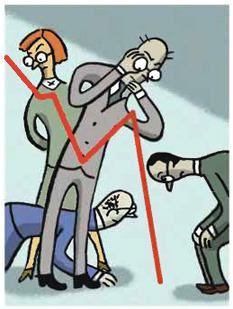John Cassidy's Blog, page 75
May 1, 2013
Obama and Syria: Decision Day Approaches

Tuesday’s press conference marking the hundred-day mark in Barack Obama’s second term was revealing in many ways. If you are still wondering what sort of character resides behind the cool, detached visage that the forty-fourth President presents to the world, the answer was plain to see: a cool, detached attorney, but one who hasn’t wholly forgotten the idealism that propelled him through Harvard Law School and onto the streets of Chicago’s South Side.
Asked about the tricky case of the Syrian dictator Bashar al-Assad and his alleged use of sarin gas against his own people, Obama, to the outrage of many armchair interventionists, remarked, “We don’t have chain of custody that establishes what exactly happened”—an answer that could be roughly translated into English as, “Back off, buster. I’m not going to rushed into anything.” But when he was quizzed about the hunger strike at Guantánamo Bay, he dropped the legalese and renewed his calls for the detention center to be closed, saying, “The idea that we would still maintain forever a group of individuals who have not been tried—that is contrary to who we are, it is contrary to our interests, and it needs to stop.”
April 30, 2013
Two Economies: Private Sector, Good; Public Sector, Bad

The news that house prices have risen by almost ten per cent during the past twelve months, the fastest rate of increase in almost seven years, confirms a trend seen in other recent reports on the economy: the private sector—excluding the unemployed—is doing pretty well. But retrenchments in the public sector, which accounts for roughly a fifth of G.D.P., are holding back the recovery, and, indeed, jeopardizing its future.
Let’s start with the positive developments. One of the reasons that this recovery, which technically began in July, 2009, has been so weak is that the bombed-out housing sector has acted as a big drag on spending. In most recoveries, residential construction, and other spending associated with housing, is a key engine of growth. But for at least the first couple of years of this recovery, the housing sector was actually detracting from G.D.P. growth. Last year, things picked up a bit, and the trend is continuing. Since last summer, residential investment has been rising at an annual rate of about fifteen per cent, albeit from a low base.
April 29, 2013
The Reinhart and Rogoff Controversy: A Summing Up

In one of life’s little ironies, last Friday’s disappointing G.D.P. figures, which reflected a sharp fall in government spending, appeared on the same day that the economists Carmen Reinhart and Kenneth Rogoff published an Op-Ed in the Times defending their famous (now infamous) research that conservative politicians around the world had seized upon to justify penny-pinching policies. Addressing a new paper by three lesser lights of their profession from the University of Massachusetts, Amherst, which uncovered data omissions, questionable methods of weighting, and elementary coding errors in Reinhart and Rogoff’s original work, and which went around the world like a viral video, the Harvard duo dismissed the entire brouhaha as “academic kerfuffle” that hadn’t vitiated their main points.
Really? Even somebody living in a bubble stretching over Harvard Yard would have difficulty believing that. For all of the illuminating work Reinhart and Rogoff have done on the history of financial crises and their aftermaths, including their popular 2011 book “This Time Is Different: Eight Centuries of Financial Folly,” their most influential claim was that rising levels of government debt are associated with much weaker rates of economic growth, indeed negative ones. In undermining this claim, the attack from Amherst has done enormous damage to Reinhart and Rogoff’s credibility, and to the intellectual underpinnings of the austerity policies with which they are associated. In addition, it has created another huge embarrassment for an economics profession that was still suffering from the fallout of the financial crisis and the laissez-faire policies that preceded it. After this new fiasco, how seriously should we take any economist’s policy prescriptions, especially ones that are seized upon by politicians with agendas of their own?
April 25, 2013
What If the Tsarnaevs Had Been the “Boston Shooters”?

Here’s a little mental experiment. Imagine, for a moment, that the Tsarnaev brothers, instead of packing a couple of pressure cookers loaded with nails and explosives into their backpacks a week ago Monday, had stuffed inside their coats two assault rifles—Bushmaster AR-15s, say, of the type that Adam Lanza used in Newtown. What would have been different?
Well, for one thing, the brothers would probably have killed a lot more than three people at the marathon. AR-15s can fire up to forty-five rounds a minute, and at close range they can tear apart a human body. If the Tsarnaevs had started firing near the finish line, they might easily have killed dozens of spectators and runners before fleeing or being shot by the police.
April 24, 2013
Is Apple in Decline? The Great Debate Continues

After weeks of eager anticipation on Wall Street, Apple released its latest earnings report after the market closed on Tuesday. Between January and March, the company sold 37.4 million iPhones, beating analysts’ estimates of 36.5 million, and it sold 19.5 million iPads, against an expected figure of 18.3 million. It generated a hefty $9.5 billion in pre-tax profits and said it would spend up to a hundred billion dollars on stock buybacks before the end of 2015.
Coming from any normal company, these would be extraordinary numbers. Apple’s problem is that investors had come to expect the extraordinary and then some. In the same month last year, the company earned $11.6 billion, as consumers around the globe snapped up iPhones and iPads. During the past few months, Apple’s stock has been tumbling on fears that Samsung and other competitors are successfully undercutting these premium-priced products. After reaching a peak above seven hundred dollars last October, it has fallen to as low as three hundred and ninety dollars.
April 22, 2013
After Boston, a Few Facts About Terrorism

As Boston honors and buries the victims of last week’s heinous bombings, it is well to remember, after Friday’s media-intermediated lockdown drama, that for the families of the dead and injured this was an intensely personal and private tragedy. Yesterday, a memorial service was held for Martin Richard, the eight-year-old boy who was the youngest victim. This morning was the funeral of Krystle Campbell, a twenty-nine-year-old trainee restaurant manager. Tonight, a memorial service will be held for Lu Lingzi, a twenty-three-year-old graduate student from China.
...read moreApril 20, 2013
Terrorist Hunt Sends America Over the Edge

It was about 1 P.M. on Friday when I decided this fine country of ours had lost its moorings and gone a little nuts. That was when I heard that the authorities—which particular ones wasn’t clear—had stopped the trains running between New York and Boston. At Penn Station, a radio reporter said, Amtrak passengers and trains were piling up.
It wasn’t just the trains, it turned out. Some of the airspace over Boston was closed lest … well, it wasn’t clear lest what, but lest something. Logan Airport remained open, but there wasn’t any mass transit running to and from it. And all this on a Friday at lunchtime, when tens of thousands—who knows, maybe hundreds of thousands—of people are preparing to move north or south along the Boston-New York corridor. Even buses were halted, thus enabling the benighted Tsarnaev brothers to achieve something that proved beyond Emperor Hirohito and Hitler. They stopped the Greyhound.
April 19, 2013
The End of the Honeymoon for Obama: What’s Next

Barack Obama is going gray, and no wonder. He said a while back that it was hereditary, but weeks like this one must be accelerating the process. Even before Friday’s dramatic shootout and manhunt in Watertown, it had been a remarkably stressful few days for the President.
On Thursday morning, barely twelve hours after standing in the White House Rose Garden and consoling some of the Newtown parents who had come to Washington in a futile effort to put pressure on Congress to introduce tougher gun laws, he departed for Boston, where he told an interfaith service at the Cathedral of the Holy Cross, “Every one of us stands with you.” His speech was artful and heartfelt, as were his remarks in the Rose Garden. But in Washington, they don’t give out many marks for artistic impression, and they don’t suspend politics for memorial services. By Thursday evening, when Obama returned to the White House, Politico’s Jim VandeHei and Mike Allen, two of the most widely read journalists in the capital, had posted a lengthy article entitled “Behind the Curtain: Obama, boxed in,” which read like an early obituary for his second term:
Obama, regardless of the personality and political approach he displays on any given day, keeps running into the same wall of insurmountable opposition. The cold, hard reality is that the president is trapped in a very frustrating box: He realizes that the vast majority of Congress is as impervious to his pressure as it is his charm. He is damned if he does, damned if he doesn’t — and he knows it, several of his friends tell us....read more
April 18, 2013
Could The N.R.A.’s Big Victory Backfire?

Like most people, I’m outraged, if not entirely surprised, by the Senate’s failure to adopt any gun-control measures following the massacre in Newtown. In responding with righteous and justified anger, President Obama said most of what needed to be said. Wednesday was indeed “a pretty shameful day for Washington.”
But rather than despairing, which is usually the appropriate attitude when it comes to tangling with the gun lobby, let’s try to look on the brighter side. In blocking an extension of background checks that has overwhelming public support, even among gun owners, the National Rifle Association and the politicians it holds captive may have made a historic blunder. Rather than settling for a compromise measure that would have given gun nuts almost all they wanted—no ban on assault rifles or multi-round magazines, no background checks on private sales between families and friends, no restrictions on carrying guns across state lines, no national registry of gun-owners—the N.R.A. decided to go for an all-out victory, making a mockery of representative democracy.
April 17, 2013
The Crumbling Case for Austerity Economics

The gods have a dark sense of humor, it would seem. Just as Mrs. Thatcher, the great hero of conservative economics is being laid to rest, the arguments for the austerity policies that she championed are crumbling before our eyes.
Back in 1979, Mrs. Thatcher resurrected the dogma of budget cutting and deficit reduction from the history books to which it had been consigned during the Great Depression. Adopting a “medium-term financial strategy” that slashed spending by more than ten per cent in real terms, and which envisaged the budget deficit falling by four per cent of G.D.P. in just five years, she ignored warnings that such a strategy would plunge the U.K. economy into a deep recession, which it did. Despite soaring unemployment and a stubbornly high deficit, she refused to admit that her policies had backfired, famously remarking, in 1981, “the lady’s not for turning.”
...read moreJohn Cassidy's Blog
- John Cassidy's profile
- 56 followers



